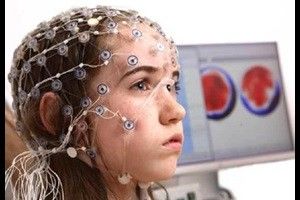Last year, OpenBCI burst onto the scene with a Kickstarter campaign to fund development of an open source brain-computer interface for makers. The company more than doubled its goal of raising $100,000 for its EEG platform and, as I write this, OpenBCI is preparing to ship its first run of finished products. Conor does a demo of the technology in the link below:
OpenBCI Demo by Conor Russomano
Recently, I had a chance to talk with OpenBCI co-founder Conor Russomanno to get his thoughts on how open source has changed the brain-computer interface (BCI) landscape and opened new opportunities in the present, and how it might affect future development opportunities as well.
“The one thing that we’re hoping to achieve with OpenBCI is to really lower the barrier of entry – both in terms of educational materials but also cost,” Russomanno said. “I think one really awesome implication is that, in a classroom or laboratory, where one research grade EEG system was used by a number students, now the same amount of money could be used to outfit every student with their own device. And we’ve seen that in our customer base, as a huge proportion of our customers are students, graduate-level researchers and professors who want to use OpenBCI as a learning tool.”
Another exciting change that OpenBCI is creating is an open source community that allows users and makers to connect and share their knowledge to take the technology even further, Russomanno noted. In fact, OpenBCI is dedicating a fair chink of its resources to create that community.
“Probably the quickest people to jump on the preorders and the Kickstarters were students and researchers who were already working with existing EEG devices. We are trying to get more people interested by creating a community, putting out instructional guides and making it more approachable.
“I like to think what we’re doing with OpenBCI as Lego meets EEGs. I think of what we’re building as not a finished product, but as a narrow building block. And we want the world to use these blocks to build the cool stuff,” he said.
While the success and acclaim OpenBCI has received in mainstream media has been exciting, as he looks at the opportunities for further development of open source BCI, Russomanno is cautiously optimistic. In my mentioning of some of the farther-reaching future implications of BCI technologies, Conor brought the conversation back to the present, seeming less interested in far away “what ifs” than in how the next step forward in research might be taken:
“I think its important to be realistic about what the technology is capable of,” he said. “There are still a lot of challenges and they’re not all going to be solved by the same company or by a single field of research. It’s important that people collaborate together, specialize and improve upon a small facet of the problem by sharing that information with someone else who has solved another small facet.
“What we’re trying to do with OpenBCI is to expose all of the weaknesses of the full system and say ‘Hey guys! Jump in! What can you do to improve this other piece?’”
Another hurdle Russomanno hopes open source BCI can bridge in the future is the gap between the enthusiastic expectations of the general public and the realistic limits of the current technology. While an enthusiastic hope of BCI might involve telepathic control of technology or complete conscious “embodiment” in a robotic form, the current reality of BCI is less “far out.” The calibration of today’s external BCI devices still involves a relatively slow process of attuning to individual brain patterns, and isn’t nearly at “telepathic” levels, although some researchers have been able to develop significant control of devices and games with EEG headsets.
“I think many people would agree that the ‘Holy Grail’ of practical, wearable EEG is a sensor. Right now, it’s very difficult to acquire a strong EEG signal from outside the scalp because you’ve got a lot of things that produce ‘noise,’” he continued. “I’m not sure if it will ever happen, but the one problem that needs to be optimized is the electrode problem. We’ve broken out the header pins so you can attach any electrode on, so if that Holy Grail does get found in the next one or two years, hopefully you’ll just be able to plug it right into the OpenBCI board.
“On the other end of the spectrum,” Russomanno continued. “Once you’ve got good spatial resolution, a high number of channels and a good quality of signal, what do you do with this data now that you’re collecting it? How do you classify this information to create a system that responds in a pre-determined way?
“That’s where software and research comes in. You’ve got electrical engineers that need to solve the electrode problem. But then you’ve got data analytics and programmers that need to work together to create algorithms that will classify massive amounts of data,” he noted.
Conor’s earlier comment about the interdisciplinary nature of BCI research starts to hit home, but he wasn’t done yet. After software challenges, there’s one more hurdle left for the full optimization of open source BCI, he added.
“Every brain is similar but every brain is unique. When it gets to that point where we’ve got enough systems producing enough data that it can be scaled cheaply from individual to individual, then it’s a matter of building an interface that’s user customizable that has enough flexibility to be able to refine its classification inputs to match the specific user.”
Ultimately, Russomanno says the mission for OpenBCI is to make the technology more accessible and that, wherever open source BCI goes in the future, a community based on cooperation and collaboration will take it there.
With so much to work on, he’s aiming to facilitate the global conversation necessary to bring BCI to the next level, without funding it all in his own proprietary lab. If all brains are unique, then we’ll learn more about calibrating devices by testing and tinkering with people all over the world. Conor’s aim, however, it not just to use their heads as experiments, but to generate new hypotheses to test and ideas to explore — expanding the field for everyone.
“Putting our heads together” takes on multiple literal interpretations here, and that’s how he intends it.
Conor ended our chat with come practical advice for researchers and makers who want to help the cause: “The best way for people to join that community is to acquire the technology, try to figure out how to make it work, be vocal on the forums and keep spreading the open source wildfire.”

